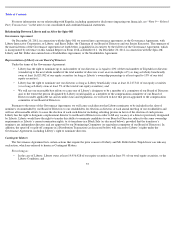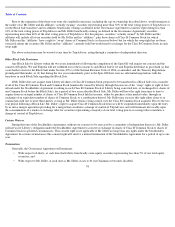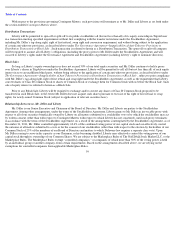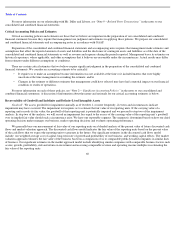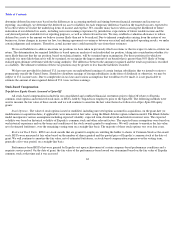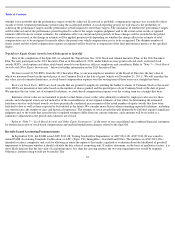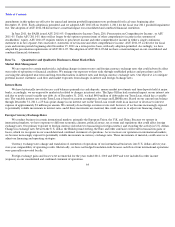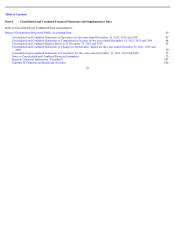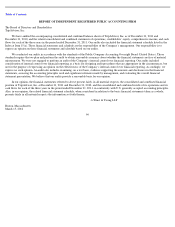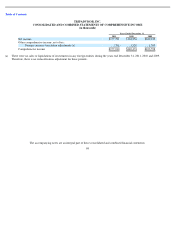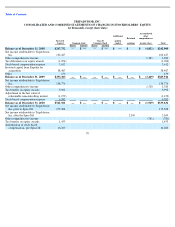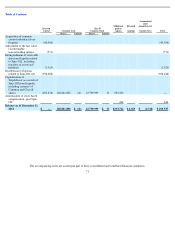TripAdvisor 2011 Annual Report Download - page 66
Download and view the complete annual report
Please find page 66 of the 2011 TripAdvisor annual report below. You can navigate through the pages in the report by either clicking on the pages listed below, or by using the keyword search tool below to find specific information within the annual report.
Table of Contents
determine deferred income taxes based on the differences in accounting methods and timing between financial statement and income tax
reporting. Accordingly, we determine the deferred tax asset or liability for each temporary difference based on the enacted tax rates expected to
be in effect when we realize the underlying items of income and expense. We consider many factors when assessing the likelihood of future
realization of our deferred tax assets, including our recent earnings experience by jurisdiction, expectations of future taxable income and the
carryforward periods available for tax reporting purposes, as well as other relevant factors. We may establish a valuation allowance to reduce
deferred tax assets to the amount we believe is more likely than not to be realized. Due to inherent complexities arising from the nature of our
businesses, future changes in income tax law, tax sharing agreements or variances between our actual and anticipated operating results, we make
certain judgments and estimates. Therefore, actual income taxes could materially vary from these estimates.
We record liabilities to address uncertain tax positions we have taken in previously filed tax returns or that we expect to take in a future tax
return. The determination for required liabilities is based upon an analysis of each individual tax position, taking into consideration whether it is
more likely than not that the tax position, based on technical merits, will be sustained upon examination. For those positions for which we
conclude it is more likely than not it will be sustained, we recognize the largest amount of tax benefit that is greater than 50% likely of being
realized upon ultimate settlement with the taxing authority. The difference between the amount recognized and the total tax position is recorded
as a liability. The ultimate resolution of these tax positions may be greater or less than the liabilities recorded.
We have not provided for deferred U.S. income taxes on undistributed earnings of certain foreign subsidiaries that we intend to reinvest
permanently outside the United States. Should we distribute earnings of foreign subsidiaries in the form of dividends or otherwise, we may be
subject to U.S. income taxes. Due to complexities in tax laws and various assumptions that would have to be made, it is not practicable to
estimate the amount of unrecognized deferred U.S. taxes on these earnings.
Stock-Based Compensation
TripAdvisor Equity Grants Assumed at Spin-Off
All stock-based compensation included in our consolidated and combined financial statements prior to Spin-Off relates to Expedia
common stock options and restricted stock units, or RSUs, held by TripAdvisor employees prior to the Spin-Off. The following methods were
used to measure the fair value of these awards and we will continue to amortize the fair value thereof as follows for all pre-Spin-Off equity
grants:
Stock Options . The value of stock options issued or modified, including unvested options assumed in acquisitions, on the grant date (or
modification or acquisition dates, if applicable) were measured at fair value, using the Black-Scholes option valuation model. The Black-
Scholes
model incorporates various assumptions including expected volatility, expected term, dividend yield and risk-free interest rates. The expected
volatility was based on historical volatility of Expedia’
s common stock and other relevant factors. The expected term assumptions were based on
our historical experience and on the terms and conditions of the stock awards granted to employees. We will continue to amortize the fair value,
net of estimated forfeitures, over the remaining vesting term on a straight-line basis. The majority of these stock options vest over four years.
Restricted Stock Units . RSUs are stock awards that are granted to employees entitling the holder to shares of Common Stock as the award
vests. RSUs were measured at fair value based on the number of shares granted and the quoted price of Expedia’s common stock at the date of
grant. We will continue to amortize the fair value, net of estimated forfeitures, as stock-based compensation expense over the vesting term,
generally a five-year period, on a straight-line basis.
Performance-based RSUs that were granted by Expedia vest upon achievement of certain company-based performance conditions and a
requisite service period. On the date of grant, the fair value of the performance-based award was determined based on the fair value of Expedia
common stock at that time and it was assessed
62





